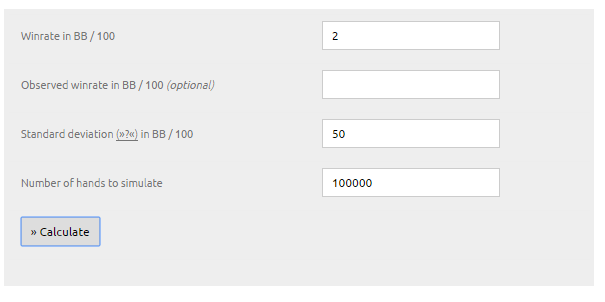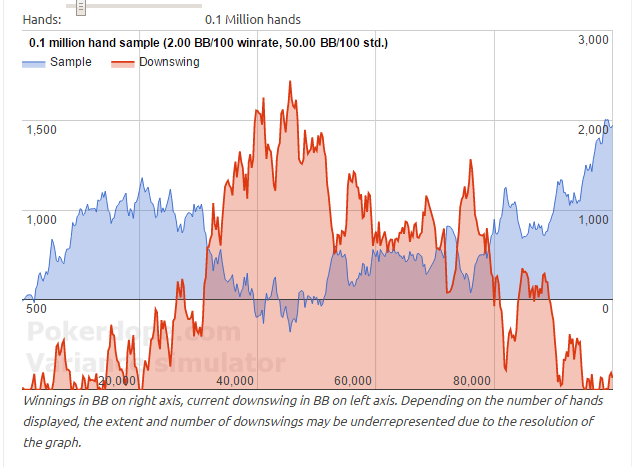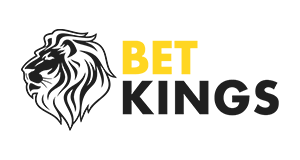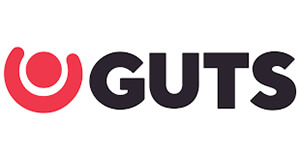Bankroll management
Bankroll management is an incredibly vital yet often overlooked part of Poker strategy. Good bankroll management allows you to mitigate variance. A properly sized bankroll will give you a low chance of going busto with variance.
Picture this – you are a professional grinder. You cash out to make a downpayment on a car. You leave 15 buy-ins in your account, having not suffered major variance in a long time.
Next month, you run 20 BI below EV and go busto. Without cash to play with, how do you keep playing to make your car payments, pay your rent, or buy groceries?
In this guide, we will teach you how to avoid such horrible situations.
Bankroll Management – Understanding Variance
Variance is a statistical term that measures how “randomness” affects a value. In poker that value is your winnings. The randomness, or variance, is a factor of your play style and luck. For example, to have high variance means you have big upswings and downswings.
Statistically, variance would be the dispersion of your winrate over any given 100 hand sample. So, if you tend to either win big or lose big in each sample of 100 hands, you would be high variance. A player who consistently performs near his average has low variance.
Many people wrongly use the term variance only to describe downswings. Variance does not say anything about how much you win or lose. Many online crushers play a high variance style with results in massive swings, yet they profit huge year after year.
Bankroll Management – Calculating Risk of Ruin
Thus, it is incredibly important to prepare for variance with an appropriately sizes bankroll.
This means using stats to determine your risk of ruin from your win rate and variance. A risk of ruin measures the likelihood of going broke with a given bankroll size.
Pokerdope offers an amazing tool for this. Example: A 6-max grinder who plays 50k hands per month has a win rate of 4bb/100 and a SD (a related measure of variance) of 160bb/100. He has a bankroll of 20 buy ins or 2000bb.
Example: A 6-max grinder who plays 50k hands/month has a winrate of 4bb/100 and a SD of 100bb/100 (note the calculator takes BB, not bb).
According to this calculator, he needs a bankroll of 1872BB ($3744!) to have a <5% chance of going busto over any two months (100k hands).
This should surprise you – a solid winner at 4bb/100 having a 5-10% chance of losing 20 buy-ins over 2 months doesn’t seem to make sense. But it’s true.
Randomly simulated 100k sample for this player. Note that though he profits 20 BI over the 100k hands, he still suffers a 16 buy-in downswing!
Bankroll management: Taking shots
The minimum bankroll size I can recommend is 20 buyins. 40 buy-ins is even safer. If you are playing low or midstakes, I’d go as far as to recommend bankroll of 50-100 buy-ins to be safe.
You can play with less or more depending on your risk tolerance. A bankroll of 20 BI keeps the risk of going broke somewhat low without requiring you to commit too much money.
Let’s say you are an NL50 crusher looking to play NL100. You have a bankroll of 1500, or 30 BI.
Before moving to NL100, grow your bankroll to 2000, which would be 20 buy ins for the new limit.
Set limits for your losses at the new limit. If you fall below 15 buyins when taking a shot, move back down to NL50 and grind your way back to 2000. You will have a 30 buy-in bankroll at NL50, which gives you a relatively low chance of going broke.
Bankroll Management Strategy for 20 buy-in Bankroll.
Conclusion
Bankroll management is an incredibly important skill in poker. It makes the difference between sticking around year after year, or going busto and quitting within weeks.
























